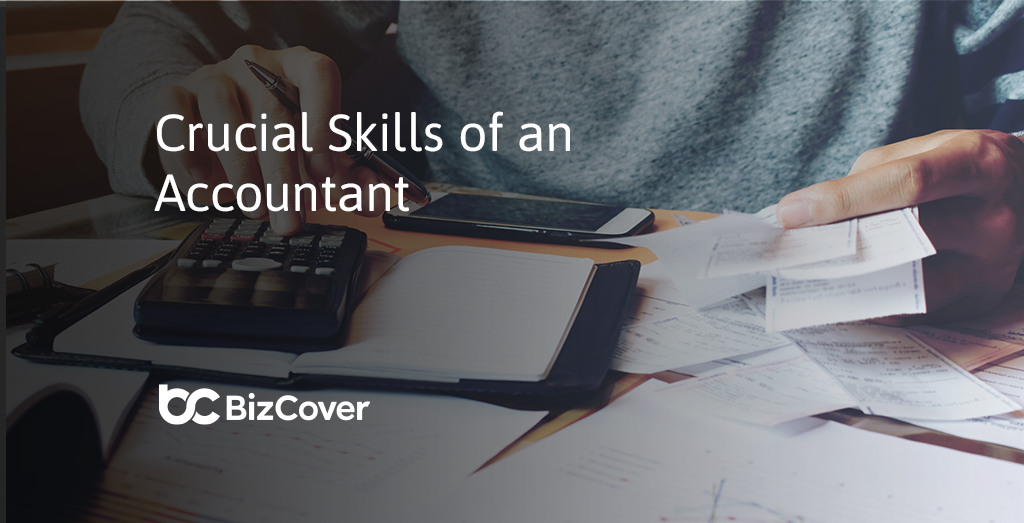9 crucial skills of an accountant to succeed on the Job
Accounting is a unique profession in that it requires that professionals be both data and numbers-focused while also being people-oriented. Accountants use their accounting skills and bookkeeping skills to analyse data and draw useful business insights from that data.
However, to be an accountant also requires interacting with a diverse range of professionals and translating often complex financial information into useful business insights that can be understood by the average person.
If you are considering enrolling in accounting studies and pursuing a rewarding, long-term career as a qualified accountant, you may be wondering what combination of hard skills and soft skills will enable you to succeed in your career in accounting.
To set yourself up for a promising career in accounting, here are 10 crucial skills for succeeding as an accountant. If you can demonstrate your competency in these 10 skills you will very likely be ready to make it as an accounting professional.
1. In-depth knowledge of accounting practices
Many business owners and managers have some basic accounting knowledge or accountancy skills under their belt. However that may merely be scratching the surface when compared to the wealth of knowledge accountants hold.
Generally Accepted Account Principles, or GAAP for short, are a set of principles that standardise accounting practices across all types of industries and companies. To ensure that financial reporting requirements are met, and that the accounting practices of a business remain honest, it is important that accountants become very familiar with all current and relevant regulations that govern corporate finance and public finance.
2. Proficiency in using accounting software
Common spreadsheet software and reconciliation software are essential tools that accountants will benefit from knowing like the back of their hand. Accountants should also be familiar with technical accounting skills such as financial reporting and analysis, project management, compliance, and database reporting.
Taxation software is essential if you are going to prepare taxes. Even if your job is not to prepare tax returns, it is likely that you will be providing financial information to others and preparing documents for them. As such, a sound knowledge of tax software packages can help you rise above other candidates when applying for your first accounting job.
The ability to use Enterprise Resource Planning software (ERP), is also an essential accounting skill for senior accountants or roles that call for financial analysis. ERP software is used by organisations to manage their day-to-day business activities, such as manufacturing, supply chain, and operations. Using business analytics software to its full potential is also a key skill for accounting professionals. It takes raw data and turns it into meaningful information that can be used to make informed business decisions.
3. The ability to accurately prepare financial statements
Financial statements are the bread and butter for many accountants. Financial statements provide a snapshot of an organisation’s financial activities and current financial health. To get a head start on the competition when it comes to preparing financial statements, aspiring accountants may try their hand at preparing some draft income statements (profits and losses), cash flow statements, and balance sheets (a summary of equity, liabilities, and assets) before they start their first accounting job.
4. A sound understanding of general business practices
Many universities allow accounting undergraduate students to combine a relevant bachelor’s degree with an MBA in leadership and management, which can add business operations knowledge to your curriculum. This can be a great way to prepare for a career in accounting.
It is likely that you will be working alongside colleagues in other departments, and with clients from other industries, with different levels of finance knowledge.
With a sound understanding of general business practices, you will be able to respond to the financial needs of each client and each colleague accordingly.
5. The ability to analyse data and draw insights
Financial data can be one of an organisation’s greatest assets. As such, understanding and interpreting financial data is vital for the role of an accountant and can help you make strategically informed decisions in just about every area of business. Accounting professionals will benefit from being able to analyse financial data and compile business insights from that data.
5. Critical thinking accounting skills
The ability to view business problems objectively and holistically, including all key details, however small, is a hallmark of great critical thinking. If you can see a problem from every angle, you will be able to apply accounting techniques to new and old financial data to identify issues and design solutions that meet the required ethical standards. And if you can do that, employers and clients will come to trust that you are able to think independently and conduct research to find creative solutions to business challenges.
6. Accounting organisational skills
Accountants are often required to manage multiple clients and projects simultaneously. It is therefore crucial that you are very well organised. This will not only help you to do your job better and with greater accuracy, but it will also demonstrate to your clients and employer that you can handle sensitive financial information with the utmost integrity and respect.
7. Time management skills
Prioritising your time wisely makes you a valuable asset to your employer. They will know that they can rely on you, which will empower you each time you deliver work on time and to the brief.
You may keep a detailed calendar, you may set up regular reminders on your phone and laptop, or you may refer to a daily to-do list. However you choose to manage your time is up to you, so long as it helps you to stay in charge of your schedule.
You may benefit from building some flexibility into your calendar for any unexpected urgent requests that come your way from time to time. Don’t shy away from reordering your priorities if that’s what’s required to stay on track.
8. Written and verbal communication skills
Sound written and verbal communication skills are important for most professions, and that certainly includes accounting. In the course of your accounting career you will likely be asked to give briefings, create reports, translate financial information into common language, and engage and communicate with clients and colleagues.
You will likely also work with colleagues and clients to collect, record and analyse financial data, all of which require that you have well-honed written and verbal communication skills. While being a strong communicator may not be your forte, it will pay dividends over the course of your accounting career.
9. A passion for lifelong learning
To study and learn accounting is no small accomplishment. Accounting is constantly changing and has strict compliance requirements. Your employer will appreciate your proactive approach to keeping in step with accounting industry standards, accounting best practice, and accounting industry changes.
How BizCover helps accountants with accounting insurance
As a tech innovator in the small business insurance space, BizCover provides a quick and easy way for accountants to compare competitive accounting insurance* quotes online and purchase their accounting insurance in less than 10 minutes. Common types of accounting insurance that accountants may consider include:
Professional Indemnity insurance
Protects your business from losses arising out of acts, errors and omissions from a wide variety of services, including:
- Accounting and bookkeeping errors
- Failure to fully comply with audit undertaking
- Incorrect tax preparation
- Returns not lodged in time
- Negligence in rendering professional services
- Incorrect analysis and interpretation of the numerical data
Business Insurance
An insurance package that provides cover for business contents, stock, tools and commercial premises when an insured event occurs. A Business Insurance package also covers portable equipment, glass and for loss of revenue due to business interruption in specified circumstances. In addition, cover is available for public liability, tax audit, employment practices and statutory liability risks.
Cyber Liability insurance
Cyber Liability insurance is business insurance that helps protect your business from claims and supports your profitability if a cyber breach or attack occurs. Costs associated with defending a cyber claim are also covered.
Learn about insurance for accountants and compare competitive insurance quotes, get covered in just 10 minutes, and get on with your day. If you prefer a phone call you can reach our friendly team on 1300 920 863.
This information is general only and does not take into account your objectives, financial situation or needs. It should not be relied upon as advice. As with any insurance, cover will be subject to the terms, conditions and exclusions contained in the policy wording.
© 2022 BizCover Pty Limited, all rights reserved. ABN 68 127 707 975; AFSL 501769
ABN 68 127 707 975; AFSL 501769
This information is general only and does not take into account your objectives, financial situation or needs. It should not be relied upon as advice. As with any insurance, cover will be subject to the terms, conditions and exclusions contained in the policy wording. © 2025 BizCover Limited.





